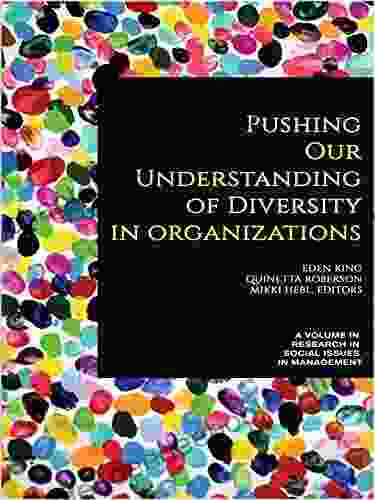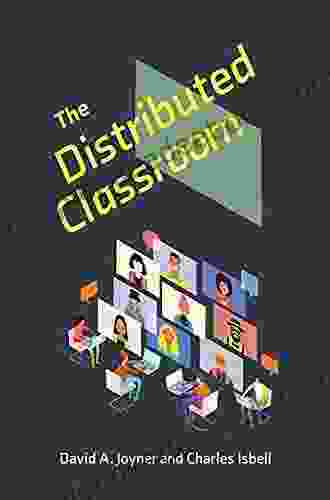Pushing Our Understanding of Diversity in Organizations: Research in Social and Organizational Psychology

4.5 out of 5
| Language | : | English |
| File size | : | 1333 KB |
| Text-to-Speech | : | Enabled |
| Screen Reader | : | Supported |
| Enhanced typesetting | : | Enabled |
| Word Wise | : | Enabled |
| Print length | : | 232 pages |
Diversity is a complex and multifaceted concept that has been gaining increasing attention in the field of organizational psychology. As organizations strive to become more inclusive and equitable, it is crucial to push our understanding of diversity beyond traditional demographic categories and explore its deeper social and psychological implications.
This article delves into the need for further research in social and organizational psychology to advance our understanding of diversity in organizations. It highlights the importance of considering intersectionality, unconscious bias, and power dynamics in promoting true diversity and inclusion in the workplace. The article provides insights from current research and suggests avenues for future exploration, emphasizing the significance of creating inclusive organizational cultures that value and leverage the unique perspectives of all employees.
Intersectionality and the Multidimensionality of Diversity
Intersectionality is a theoretical framework that recognizes the interconnectedness of multiple forms of oppression and discrimination based on race, gender, sexual orientation, socioeconomic status, and other social identities. By considering intersectionality, researchers can gain a more nuanced understanding of the unique experiences and challenges faced by individuals from marginalized groups.
For example, research has shown that Black women experience a unique form of discrimination that is distinct from the discrimination faced by Black men or White women. This intersectional discrimination can manifest in various forms, such as wage disparities, underrepresentation in leadership positions, and increased vulnerability to sexual harassment.
Unconscious Bias and its Impact on Diversity
Unconscious bias, also known as implicit bias, refers to the automatic and often unintentional stereotypes and prejudices that individuals hold about others based on their social identities. These biases can have a significant impact on diversity in organizations, as they can lead to unfair treatment, exclusion, and discrimination.
Research has shown that unconscious bias can influence hiring decisions, performance evaluations, and promotion opportunities. For example, one study found that resumes with White-sounding names were significantly more likely to be called for an interview than resumes with Black-sounding names, even when the qualifications of the candidates were identical.
Power Dynamics and the Maintenance of Exclusion
Power dynamics play a crucial role in shaping diversity in organizations. Power imbalances can lead to the exclusion and marginalization of certain groups, as those in positions of power often have the ability to control access to resources and opportunities.
Research has shown that organizations with more diverse leadership teams tend to have more inclusive policies and practices. However, it is important to note that simply increasing the representation of marginalized groups in leadership positions is not enough to dismantle power dynamics. Organizations must also address the underlying structures and practices that perpetuate exclusion.
Creating Inclusive Organizational Cultures
To promote true diversity and inclusion in organizations, it is essential to create inclusive organizational cultures that value and leverage the unique perspectives of all employees. This involves creating environments where individuals feel safe, respected, and empowered to bring their whole selves to work.
Research has identified several key factors that contribute to inclusive organizational cultures, including:
- Leadership commitment: Senior leaders must demonstrate a genuine commitment to diversity and inclusion, and create clear policies and practices that support these values.
- Employee engagement: Employees must be actively involved in shaping and implementing diversity and inclusion initiatives, and their feedback should be valued and incorporated into decision-making.
- Bias reduction training: Organizations should provide training to employees on unconscious bias and its impact on diversity, and create opportunities for employees to practice reducing bias in their interactions.
- Accountability: Organizations must hold leaders and employees accountable for promoting diversity and inclusion, and create consequences for those who engage in discriminatory or exclusionary behavior.
Pushing our understanding of diversity in organizations through research in social and organizational psychology is essential for creating more inclusive and equitable workplaces. By considering intersectionality, unconscious bias, and power dynamics, organizations can gain a deeper understanding of the challenges faced by marginalized groups and develop more effective strategies for promoting diversity and inclusion.
Creating inclusive organizational cultures that value and leverage the unique perspectives of all employees is not only the right thing to do, but it also makes good business sense. Diverse organizations are more innovative, creative, and profitable. By embracing diversity and inclusion, organizations can unlock the full potential of their workforce and achieve greater success.
References
- Crenshaw, K. (1989). Demarginalizing the intersection of race and sex: A Black feminist critique of antidiscrimination doctrine, feminist theory and antiracist politics. University of Chicago Legal Forum, 140, 139-167.
- DiTomaso, N. (2016). Unconscious bias in the workplace: A primer for HR professionals. Society for Human Resource Management.
- Forbes, D. P., & Meyerson, D. E. (2019). Power dynamics in diversity research: Examining how power shapes the construction and use of diversity knowledge. Academy of Management Review, 44(2),274-303.
- Hewlett, S. A., Buck, E. L., & Sherbin, L. (2013). How diversity can drive innovation. Harvard Business Review, 91(12),36-43.
4.5 out of 5
| Language | : | English |
| File size | : | 1333 KB |
| Text-to-Speech | : | Enabled |
| Screen Reader | : | Supported |
| Enhanced typesetting | : | Enabled |
| Word Wise | : | Enabled |
| Print length | : | 232 pages |
Do you want to contribute by writing guest posts on this blog?
Please contact us and send us a resume of previous articles that you have written.
 Book
Book Novel
Novel Story
Story Genre
Genre Reader
Reader Library
Library Paperback
Paperback E-book
E-book Paragraph
Paragraph Sentence
Sentence Glossary
Glossary Preface
Preface Synopsis
Synopsis Annotation
Annotation Bestseller
Bestseller Biography
Biography Memoir
Memoir Reference
Reference Encyclopedia
Encyclopedia Dictionary
Dictionary Thesaurus
Thesaurus Narrator
Narrator Resolution
Resolution Archives
Archives Study
Study Research
Research Scholarly
Scholarly Lending
Lending Academic
Academic Reading Room
Reading Room Special Collections
Special Collections Interlibrary
Interlibrary Literacy
Literacy Study Group
Study Group Thesis
Thesis Dissertation
Dissertation Reading List
Reading List Book Club
Book Club Theory
Theory Textbooks
Textbooks Ishmael Reed
Ishmael Reed Stendhal
Stendhal Neil Brown
Neil Brown Debra Jason
Debra Jason Keinosuke Fukunaga
Keinosuke Fukunaga Jean Pierre Le Pan
Jean Pierre Le Pan Glenn Beck
Glenn Beck Julie Caplin
Julie Caplin Lynette Eason
Lynette Eason Peter Duffy
Peter Duffy George T Ferris
George T Ferris Zach Wahls
Zach Wahls Tracy Bryan
Tracy Bryan Wendy Knight
Wendy Knight Carole Pivarnik
Carole Pivarnik Eric Trenkamp
Eric Trenkamp David Drake
David Drake Jules Fox
Jules Fox Rajdeep Dua
Rajdeep Dua T S Eliot
T S Eliot
Light bulbAdvertise smarter! Our strategic ad space ensures maximum exposure. Reserve your spot today!

 Mario Vargas LlosaUnlocking Academic Success: A Comprehensive Guide to Pocket Study Guides
Mario Vargas LlosaUnlocking Academic Success: A Comprehensive Guide to Pocket Study Guides Eli BrooksFollow ·3.8k
Eli BrooksFollow ·3.8k Stephen FosterFollow ·18.7k
Stephen FosterFollow ·18.7k Kirk HayesFollow ·14.7k
Kirk HayesFollow ·14.7k Jonathan HayesFollow ·7.6k
Jonathan HayesFollow ·7.6k Holden BellFollow ·11.7k
Holden BellFollow ·11.7k Branden SimmonsFollow ·2.6k
Branden SimmonsFollow ·2.6k Jamie BellFollow ·13.6k
Jamie BellFollow ·13.6k James HayesFollow ·4.3k
James HayesFollow ·4.3k

 F. Scott Fitzgerald
F. Scott FitzgeraldRobot Buddies: Search For Snowbot
In the realm of...

 Mario Vargas Llosa
Mario Vargas LlosaUnlocking Academic Success: A Comprehensive Guide to...
In the ever-challenging academic...

 Gabriel Blair
Gabriel BlairMake $000 Per Month Selling Your YouTube Freelancing...
Are you looking for a...
4.5 out of 5
| Language | : | English |
| File size | : | 1333 KB |
| Text-to-Speech | : | Enabled |
| Screen Reader | : | Supported |
| Enhanced typesetting | : | Enabled |
| Word Wise | : | Enabled |
| Print length | : | 232 pages |
















